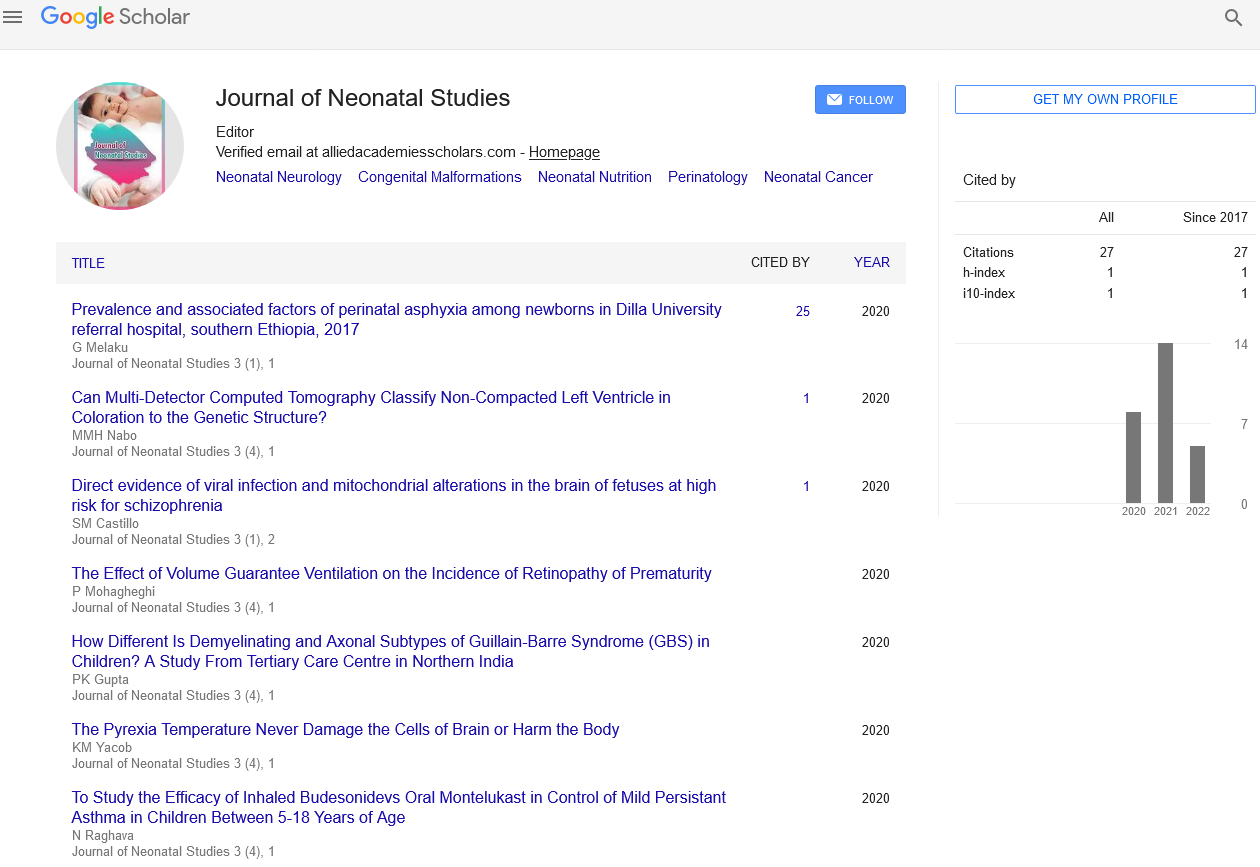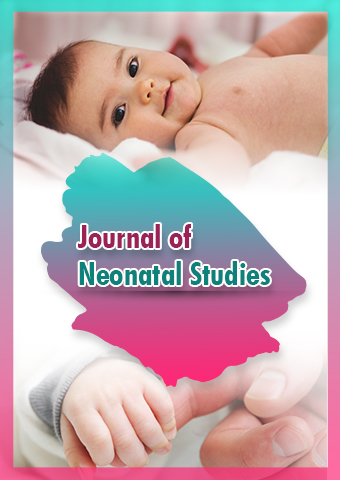Perspective - Journal of Neonatal Studies (2024) Volume 7, Issue 5
The Difference between a Neonatologist and a Pediatrician
- Corresponding Author:
- Renzo Umberto
Department of Neonatal Orthopedic, Biomedical University of Rome, Italy
E-mail: renzou574@unicampus.it
Received: 02-Sep-2024, Manuscript No. JNS-24-150528; Editor assigned: 04-Sep-2024, PreQC No. JNS-24-150528 (PQ); Reviewed: 18-Sep-2024, QC No. JNS-24-150528; Revised: 23-Oct-2024, Manuscript No. JNS-24-150528 (R); Published: 30-Oct-2024, DOI: 10.37532/JNS.2024.7(5).261-263
Introduction
The fields of neonatology and pediatrics both focus on the health and well-being of children, but there are significant differences between the two specialties. Understanding these distinctions is crucial for parents and caregivers to make informed decisions about their child’s healthcare. This article explores the roles, training, responsibilities, and areas of expertise of neonatologists and pediatricians.
Description
Pediatric care
Pediatricians are medical doctors who specialize in the care of children from birth through adolescence. They manage the physical, behavioral, and mental health of children, offering preventive care, diagnosing and treating illnesses, and providing guidance on healthy growth and development. Pediatricians are the go-to healthcare providers for routine check-ups, vaccinations, and common childhood illnesses such as ear infections, asthma, and gastrointestinal issues.
Neonatology
Neonatologists, on the other hand, are specialized pediatricians who focus on the care of newborns, particularly those who are ill or born prematurely. Their expertise lies in managing the medical complexities that arise during the neonatal period, which is the first 28 days of life. Neonatologists work primarily in Neonatal Intensive Care Units (NICUs) and handle high-risk pregnancies, birth defects, and conditions that require intensive medical intervention immediately after birth.
Training and education
The pathways to becoming a pediatrician and a neonatologist involve rigorous education and training. Both professionals must first complete medical school and a pediatric residency program. However, their training diverges thereafter.
Pediatrician
Medical school: Four years of medical education.
Pediatric residency: Three years of specialized training in pediatrics. During this period, residents gain hands-on experience in diagnosing and treating a wide range of childhood illnesses, providing preventive care, and managing chronic conditions.
Neonatologist
Medical school: Four years of medical education.
Pediatric residency: Three years of pediatric residency.
Neonatology fellowship: Additional three years of fellowship training focused on neonatal care. During the fellowship, neonatologists gain expertise in managing premature infants, congenital anomalies, respiratory distress, and other complex medical conditions that affect newborns. They also receive training in advanced procedures such as intubation, central line placement, and Extracorporeal Membrane Oxygenation (ECMO).
Scope of practice
The scope of practice for pediatricians and neonatologists differs based on the age of patients and the complexity of medical conditions they manage.
Pediatrician
Age range: Cares for children from birth to 18 years of age.
Primary responsibilities: Conduct routine check-ups, administer vaccinations, diagnose and treat common childhood illnesses, monitor growth and development, and provide guidance on nutrition, behavior, and preventive health measures. Pediatricians also manage chronic conditions such as asthma, diabetes, and ADHD, and coordinate care with specialists when needed.
Work settings: Pediatricians work in a variety of settings, including private practices, clinics, hospitals, and community health centers.
Neonatologist
Age range: Focuses on newborns, particularly during the first 28 days of life.
Primary responsibilities: Provide intensive care to premature and critically ill newborns, manage complex medical conditions such as respiratory distress syndrome, sepsis, and congenital anomalies, perform advanced procedures, and collaborate with obstetricians, pediatric surgeons, and other specialists to ensure comprehensive care. Neonatologists also offer guidance to parents on breastfeeding, neonatal care, and follow-up plans after discharge from the NICU.
Work settings: Neonatologists primarily work in NICUs within hospitals, often in tertiary care centers with advanced medical technology and resources.
Conditions treated
The conditions treated by pediatricians and neonatologists vary significantly based on their areas of expertise and patient populations.
Pediatrician
Common conditions: Pediatricians treat a wide range of common childhood illnesses, including ear infections, strep throat, colds, flu, asthma, allergies, and gastrointestinal issues such as constipation and diarrhea. They also address behavioral and developmental concerns, such as ADHD, autism spectrum disorders, and learning disabilities. Pediatricians provide preventive care through vaccinations, regular check-ups, and screenings for developmental delays and chronic conditions.
Neonatologist
Specialized conditions: Neonatologists focus on conditions that affect newborns, particularly those that require intensive medical care. These include prematurity and its complications, respiratory distress syndrome, bronchopulmonary dysplasia, neonatal jaundice, hypoxic-ischemic encephalopathy, neonatal sepsis, congenital heart defects, gastrointestinal anomalies, and metabolic disorders. Neonatologists are skilled in stabilizing critically ill newborns, providing respiratory support, managing nutritional needs, and coordinating multidisciplinary care.
Collaboration and continuity of care
Collaboration between pediatricians and neonatologists is essential for ensuring continuity of care for newborns, especially those with complex medical needs.
Collaboration: When a newborn requires intensive care, neonatologists provide immediate and specialized treatment in the NICU. Once the infant is stable and ready for discharge, neonatologists collaborate with pediatricians to create a comprehensive follow-up plan. This plan includes monitoring the infant’s growth and development, managing any ongoing medical issues, and ensuring that parents receive the support and education they need.
Continuity of care: After discharge from the NICU, pediatricians take over the primary care of the infant, providing routine checkups, vaccinations, and addressing any medical concerns. Pediatricians continue to monitor the child’s health and development, and they can refer the child back to a neonatologist or other specialists if further intervention is needed. This collaborative approach ensures a seamless transition from intensive neonatal care to routine pediatric care, promoting the best possible outcomes for the child.
Importance of choosing the right specialist
Choosing the right specialist for a child’s healthcare needs is crucial for their well-being and development. Understanding the differences between pediatricians and neonatologists can help parents make informed decisions and ensure that their child receives the appropriate level of care.
Routine care: For general health maintenance, routine check-ups, vaccinations, and common childhood illnesses, parents should rely on a pediatrician. Pediatricians are skilled in providing comprehensive care for children of all ages and addressing a wide range of medical, developmental, and behavioral issues.
Specialized neonatal care: For newborns with complex medical conditions, prematurity, or critical illnesses, the expertise of a neonatologist is essential. Neonatologists have the specialized training and experience to manage the unique challenges of neonatal care and provide the intensive medical support that critically ill newborns require.
Conclusion
Pediatricians and neonatologists both play vital roles in the healthcare of children, but their areas of expertise, training, and scope of practice differ significantly. Pediatricians provide comprehensive care for children from birth to adolescence, addressing common illnesses, preventive care, and chronic conditions. Neonatologists, on the other hand, specialize in the intensive care of newborns with complex medical needs, particularly during the critical neonatal period.
Understanding the differences between these two specialties can help parents and caregivers make informed decisions about their child’s healthcare and ensure that their child receives the appropriate level of care for their specific needs. Collaboration between pediatricians and neonatologists is essential for providing seamless and comprehensive care, promoting the best possible outcomes for children at every stage of development.

